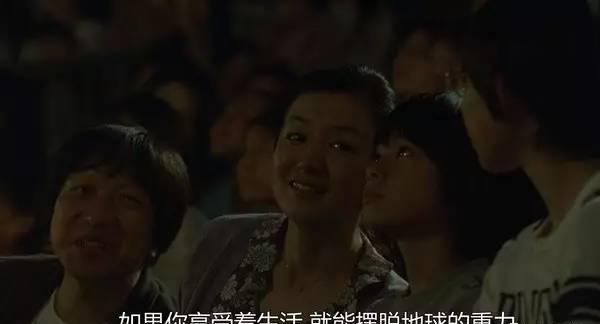
From the very beginning watching this movie, I was trying to connect the plot and the title, but I watched it for half a day without finding the connection between them, until the end of the movie, when the Okino family sat in the circus and watched the clown leap in the air, Mrs. Okano's sentence, as long as you can enjoy life, you can get rid of the gravity of the earth, let me know the meaning of "gravity clown" ...
Because of gravity, because of gravity.
The origin of "Gravity Clown" originated from the Okino family of four to go to the circus performance, parents told the children: "Don't worry, you see the clown laughing so happy, he will not fall, if you live happily, the gravity of the earth will disappear." 」 We are one floating in the air. ”
The reason why Haru was able to leap bravely without scruples was because he had always believed in his parents' words in his heart. Besides, there is a brother spring beside him.
I think the power of love is ultimately unable to resist the gravitational pull of the earth, unable to resist the laws of nature, but it can give us enough courage to face it, even if we fall down, we are not afraid.
The biggest reflection triggered by "Gravity Joker" is the determination of justice and evil. At that time, I had only seen two works by Kotaro Isaka, the other being "The Coin-Operated Locker of the Domestic Duck and the Wild Duck", and their magic was that the perpetrators were motivated by a sense of revenge and finally escaped the law silently. The beginning of the original "Gravity Clown" actually implies that Chun saved the female classmates who were almost raped, and did not get into trouble by those bad teenagers, perhaps they also thought that Chun did the right thing.
The day after the killing, Izumi said something to Haru that seemed logically confusing and irrefutable. He said that Chun must have thought about it a million times, and had gone through a lot of struggles and thoughts in his heart to make such a decision, so no one was qualified to judge Haru's behavior. The spring water prevented Haru from turning herself in.
There are two films that can be summed up in such key sentences: absent father or son, death and sin brought about by sex.
Halfway through, I suddenly understood that Kotaro Isaka's work expressed the same thing—it was all a test of good people.
Whether it is honjo who kills young girls in the buoyancy of the god of death, or the animal-abusing gangsters in the coin-operated lockers of ducks and wild ducks, their evil is absolute, and they cannot make people feel half compassion. And good people are unfortunate and have to choose to resist in one way or another. But is this justice? How is this behavior different from the wicked? But if they don't, they won't get the punishment they deserve. Such contradictions and struggles repeatedly test the hearts of good people. In the film, Izumi tells Haru that you are not wrong, I am sure that you have considered and annoyed your behavior hundreds of times, no police officer or judge has the right to say that you should not do this, and no one knows how seriously you think about this issue. Death's buoyancy once discussed whether it is possible to adopt an attitude of intolerance towards intolerant people, and the answer is no. But in the works I have seen, they have given these evil people the ending they deserve.
The controversy between legal justice and moral justice is really difficult to determine. I'm still in chaos.
Wuhezhi
Love to share beauty with you
It belongs to your mind
belong to your soul belongs to
Weibo & Wechat: Woo He Zhi
email : [email protected]
Taobao shop